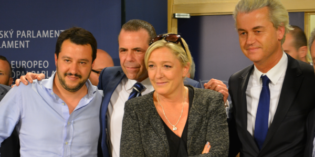EU politics

Most populist radical right parties across Europe are not eager to leave the EU
After the 2016 Brexit referendum, there was speculation that other Eurosceptic parties across the EU would try to capitalise on the result and advocate their own countries’ exit. However, Stijn van Kessel finds that any initial enthusiasm among populist radical right parties for EU-exit quickly faded, and most have been muted or equivocal in their Euroscepticism, concentrating instead on more immediate concerns of voters, who generally do not prioritise the EU.

The case of Fratelli d’Italia: how radical-right populists in Italy and beyond are building global networks
With several parties in Italy competing on the right and far right, Valerio Alfonso Bruno and James F. Downes look at the recent growth in support for Fratelli d’Italia. They argue that this party is building domestic support, along with a network of contacts of likeminded populist radical right actors globally, which demonstrates the increased mainstreaming of populist radical right ideas in liberal democracies.

How populist radical right parties have eroded the EU’s human rights agenda in the Mediterranean
It is often assumed that populist radical right parties will support disengaging from the European Union by default. Adrià Rivera Escartin writes that although many of these parties do support disengaging from the EU, there is the potential for a different approach to be adopted in future which might be termed ‘informal and illiberal Europeanisation’. Italy’s capacity to shape EU relations with Tunisia and Hungary’s efforts to influence the EU’s relations with Egypt offer two recent examples of how this trend might materialise.

Matters of consent: the Withdrawal Agreement does not violate the Good Friday Agreement
John McGarry and Brendan O’Leary write that, contrary to the DUP’s claims, the draft Withdrawal Agreement does not violate the provisions of the Good Friday Agreement when it comes to consent. Instead, the proposals regarding Northern Ireland are reasonable and balanced.

Are the DUP for turning? When the Union is perceived to be at risk, all options are on the table
The UK government’s latest attempt to push a deal through Parliament failed when the DUP withdrew support. Mary C. Murphy explains the DUP’s thinking and options. She writes that, while they can continue to pursue a strategy which is focused on revising the deal to their satisfaction, it is also possible that they could change tack completely and re-align their position in favour of the UK remaining in the EU.

The rights of non-UK EU citizens are still not a ‘done deal’
In his first appearance in the House of Commons as Prime Minister, Boris Johnson said that non-UK EU citizens would be ‘guaranteed’ the right to stay after Brexit, restating an earlier promise. However, the government has proposed no new primary legislation to achieve this. Alexandra Bulat explains how the existing settled status scheme still falls short of enshrining automatic rights, and how a ‘no deal’ Brexit would mean further uncertainties and inequalities in EU citizens’ rights.

Giving Europe political substance
Following the 2019 European Parliament elections, Mary Kaldor argues that developing substantive democracy in Europe to tame neoliberal globalisation must be the Leitmotif for the coming European term.

The Democracy in Europe Movement (DiEM25) and the limitations of transnational populism
Can you create an electorally successful left populist movement beyond the nation state? Benjamin Moffitt, Benjamin De Cleen, Panos Panayotu and Yannis Stavrakakis examine the transnational populist European movement DiEM25, which stood in several countries in the recent European Parliament elections, and considers its prospects in establishing an electorally competitive movement at the transnational level.

The populists’ trap: mainstream responses to populist new parties are a threat to democracy
New populist and nativist parties have emerged in many western democracies as a response to large-scale economic transformations, argues Stephane Wolton. The reaction by established parties in trying to imitate their anti-immigrant policies have dangerous consequences for our democratic norms.



 Democratic Audit's core funding is provided by the Joseph Rowntree Charitable Trust. Additional funding is provided by the London School of Economics.
Democratic Audit's core funding is provided by the Joseph Rowntree Charitable Trust. Additional funding is provided by the London School of Economics.